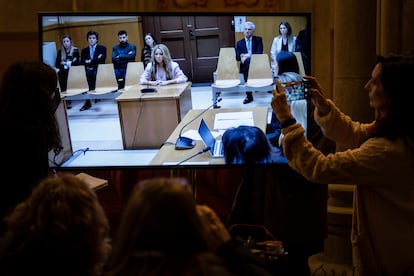The story of the deal that Shakira reluctantly accepted after the Latin Grammys
The singer, with two pending tax matters in Spain, accepted at the last minute an agreement that had been on the table for a year and a half.


When Shakira took the stage at the Palacio de Congresos in Seville to collect the Latin Grammy for best pop song, along with Bizarrap, she had already made a decision on which, in reality, she had been meditating for the last five years of her life. “I want to dedicate it to my children, because I have promised them that I will be happy,” said the Colombian singer, who verbalized her desire to heal the wounds of the breakup with former Barça defender Gerard Piqué (riddled in the lyrics of the award-winning song). But the message had another meaning: Shakira was going to close, also for her children, the legal case for defrauding 14.5 million to the Treasury.
The gala was held on Thursday 16 in the evening. The next day, in the afternoon, Shakira met in Barcelona with her lawyers, from Molins Defensa Penal, with very clear ideas. She told them that she wanted to be happy for the sake of Milan and Sasha and that she no longer wished, as she had maintained up to that moment, to submit to the trial. And she instructed them to close an agreement with the accusations (Prosecutor’s Office, State Attorney’s Office and Generalitat) that had been on the table, in fact, for a year and a half, when a first negotiation between the parties ended in failure. Between the initial draft pact proposed in the summer of 2022 and the written agreement sealed last Monday at the Barcelona Court there are hardly any differences. Shakira did not accept it then, among other things, because Piqué insisted her to fight, and because she preferred to keep her options open until the end.
Until the day after the Grammy Awards, the lawyers were preparing the trial as if it were going to take place. They were confident of a victory, like the one they obtained in the case of former motorcyclist Sito Pons, also accused of not paying taxes while he was a tax resident in Spain. In the Palace of Justice were scheduled 12 sessions and the appearance of 117 witnesses who maintained professional and personal relationships with the singer between 2012 and 2014, when according to the prosecution she was already living in Barcelona. The criminal lawyer Míriam Company remained more than a week in Miami, where the artist resides with her children, preparing a statement that was to take place in the first session, on Monday. Afterwards, according to what the president of the court had told her, Shakira could return to the United States and follow the trial, if she wished, telematically.

The best possible deal
The possibility of a last-minute deal, a common practice in tax crimes, had never been out of sight. But Shakira’s landing in Spain, a few days before the Grammy Awards, made that option gain weight. The singer told her lawyers her doubts, more linked to the media exposure of the trial and the wear and tear on her career than to the fear of losing. After warning them that she could change her mind at any time, she asked them to negotiate the pact discreetly and, at the same time, to prepare thoroughly the battle for the calendar before the Treasury: the key to the case was always whether she spent more than half of the year in Spain, a condition to be considered a tax resident.
Shakira considered her options and, according to close sources, consulted personalities from the world of music, who advised her to agree and close a matter that, as she herself expressed later, had “stolen” her time and tranquility since, in 2018, the Prosecutor’s Office filed the complaint. She agreed to the pact reluctantly and very last minute, which was not a problem because all parties already knew what the clauses of a possible agreement were. What was offered in the summer of 2022 - and a year later, when Pau Molins took over the leadership of the defense and re-engaged in negotiations - was still in place at the gates of the trial. The prosecution was not going to budge. If it accepted it, fine; if not, fine.
By accepting the prosecution’s story, Shakira has become a tax fraudster (the sentence is final), but she has avoided the trial and has seen her prison sentence and the fine to be paid reduced. The prosecution initially asked for a total of eight years and two months in prison and a fine of 23.5 million. With the sealed agreement, it modified its brief by applying a mitigating circumstance of reparation of the damage, given that it had paid more than 17 million: the defrauded quota and the interests. The agreement leaves the penalty at three years in prison in total (in reality, six months for each of the six crimes, the minimum) and a fine of 50% of the defrauded quota, that is, 7.2 million. This is, according to judicial sources, all that the Prosecutor’s Office can offer when an agreement is reached in this type of crime. “To get anything better would have been practically impossible. He has not received special treatment, but there are no better deals on offer either,” reasons Molins.
The criminal record
In addition to the money, the other key point of the agreement was what happened to the prison sentence. The possibility of Shakira ending up behind bars was remote, almost impossible. But it had to be seen whether the execution of that sentence would be suspended or replaced by a fine; it is a very technical question, but one with real-life consequences. Generally, when prison sentences are less than two years and there is no criminal record, magistrates and courts suspend their execution on the condition that no other crimes are committed within a certain time. In Shakira’s case, however, the sentence has not been suspended, but replaced by the payment of a fine of 432,000 euros.
The substitution is no longer contemplated in the current wording of the Penal Code, but it was in force when the events occurred. Molins believes that this circumstance is more advantageous for his client and is the great achievement of the agreement because, in the end, “the penalty is a fine”. The singer has a green card that allows her to reside in the United States. To renew the permit, the authorities require a criminal record certificate. Shakira Isabel Mebarak Ripoll will appear in the registry of convicted persons of the Ministry of Justice and will not be able to cancel her record, according to the law, for three years. This document contains a series of data, including the crimes committed (six crimes against public finances) and the fact that they have been replaced by a fine. In the eyes of the U.S. authorities, the lawyers point out, this substitution “will facilitate the best possible treatment”, since it is more acceptable than a prison sentence.
Two pending cases
Molins is satisfied that the pact satisfies his client, but regrets in part not having been able to “fight with his swords held high in court”. He believes he could have proved, as he did with Sito Pons, that Shakira could not be considered a tax resident during those years, despite the evidence gathered by the Tax Agency. The lawyer fought unsuccessfully to exclude 2012 from the sentence of conformity, which would have gone well for a second case that the singer still has pending in Spain despite her desire to put those problems behind her and forget her time in Barcelona.
The Tax Agency fined her for having evaded paying taxes in Spain also in 2011, a year in which she made extraordinary profits from her world tour Sale el Sol. Unlike what happened in subsequent years, that year did not end up in criminal proceedings, but only in administrative proceedings. Shakira had to pay the 60 million euro penalty in order to appeal in a case that she describes as “nonsense”. Although the sentence on the 14.5 million fraud involves recognizing that she lived in Spain since 2012, it will have no effect on that appeal, since it is already awaiting the National Court’s ruling.
Shakira is also facing a second criminal case for alleged tax fraud in Spain that has just begun. The Prosecutor’s Office has filed a complaint against her for evading the payment of six million euros in taxes in 2018 through a “network of companies” that allowed her to “simulate” the transfer of her musical rights to phantom companies. Shakira thus avoided including a part of the millionaire income obtained thanks to the El Dorado musical tour, which that year led her to give 53 concerts in Europe, the United States and Latin America. Molins predicts that this process has a “good prognosis”. The Prosecutor’s Office, for the moment, has asked Interpol to be notified of the complaint and the summons. It is foreseeable that, this time, she will testify as investigated from Miami and will not have to travel to a Barcelona that, in personal and tax matters, only brings her bad news.
Sign up for our weekly newsletter to get more English-language news coverage from EL PAÍS USA Edition
Tu suscripción se está usando en otro dispositivo
¿Quieres añadir otro usuario a tu suscripción?
Si continúas leyendo en este dispositivo, no se podrá leer en el otro.
FlechaTu suscripción se está usando en otro dispositivo y solo puedes acceder a EL PAÍS desde un dispositivo a la vez.
Si quieres compartir tu cuenta, cambia tu suscripción a la modalidad Premium, así podrás añadir otro usuario. Cada uno accederá con su propia cuenta de email, lo que os permitirá personalizar vuestra experiencia en EL PAÍS.
¿Tienes una suscripción de empresa? Accede aquí para contratar más cuentas.
En el caso de no saber quién está usando tu cuenta, te recomendamos cambiar tu contraseña aquí.
Si decides continuar compartiendo tu cuenta, este mensaje se mostrará en tu dispositivo y en el de la otra persona que está usando tu cuenta de forma indefinida, afectando a tu experiencia de lectura. Puedes consultar aquí los términos y condiciones de la suscripción digital.








































